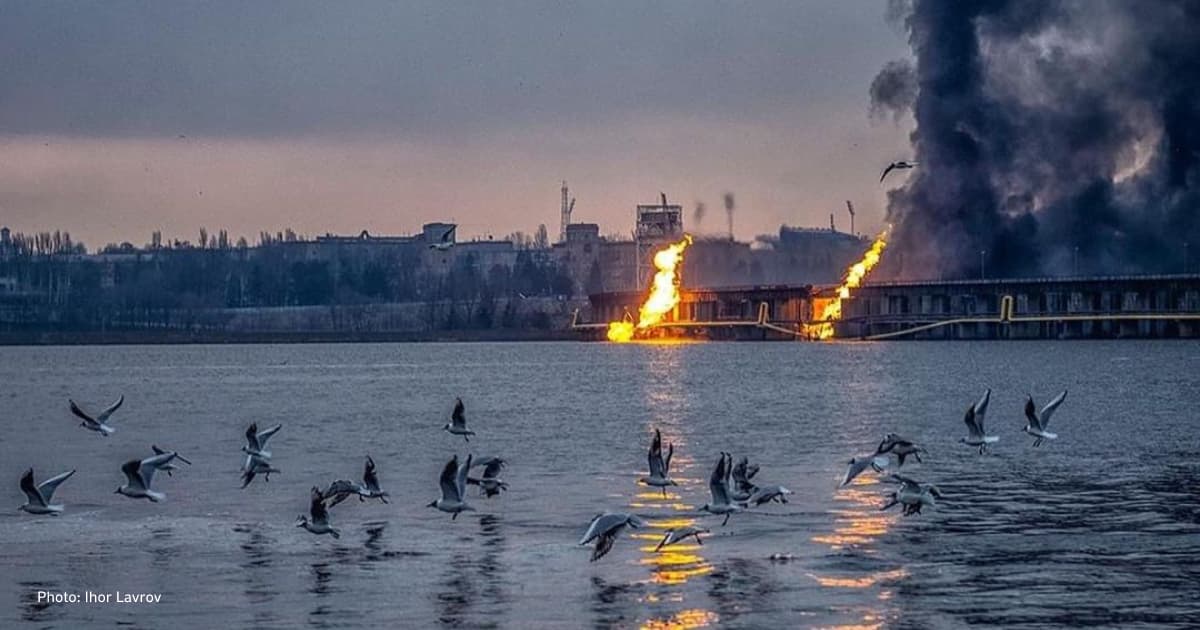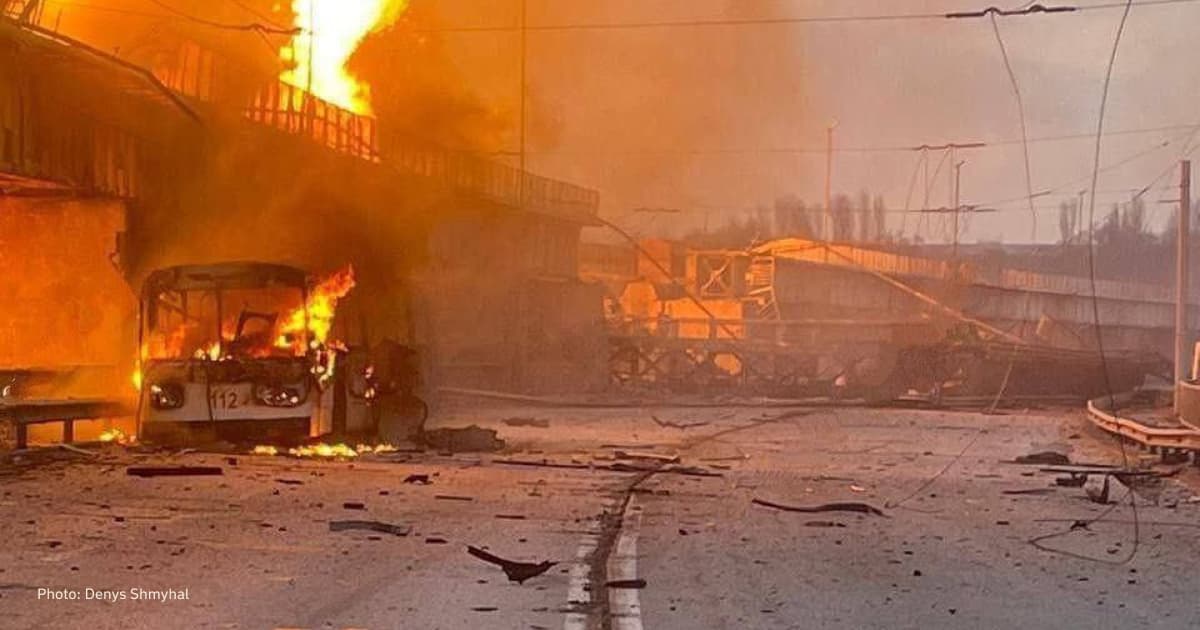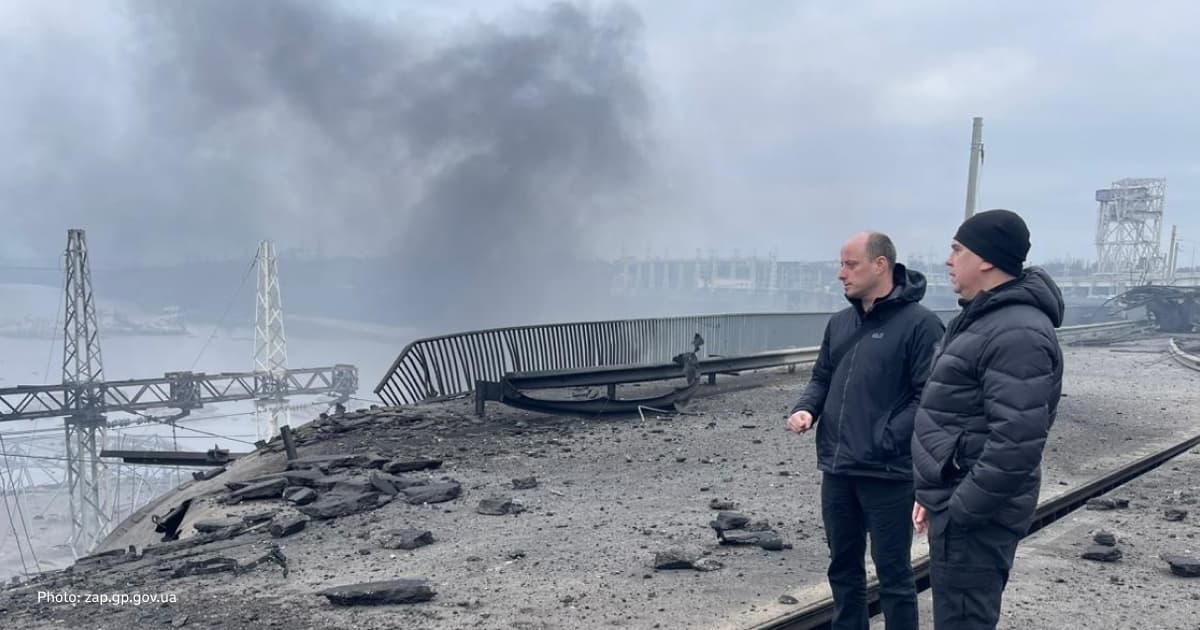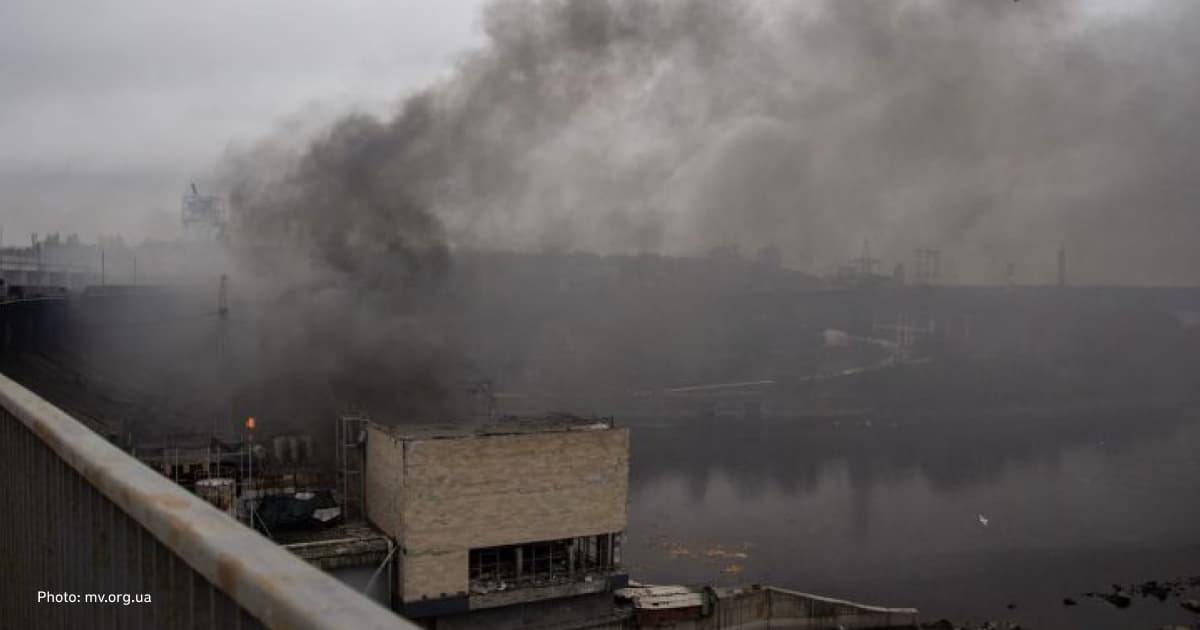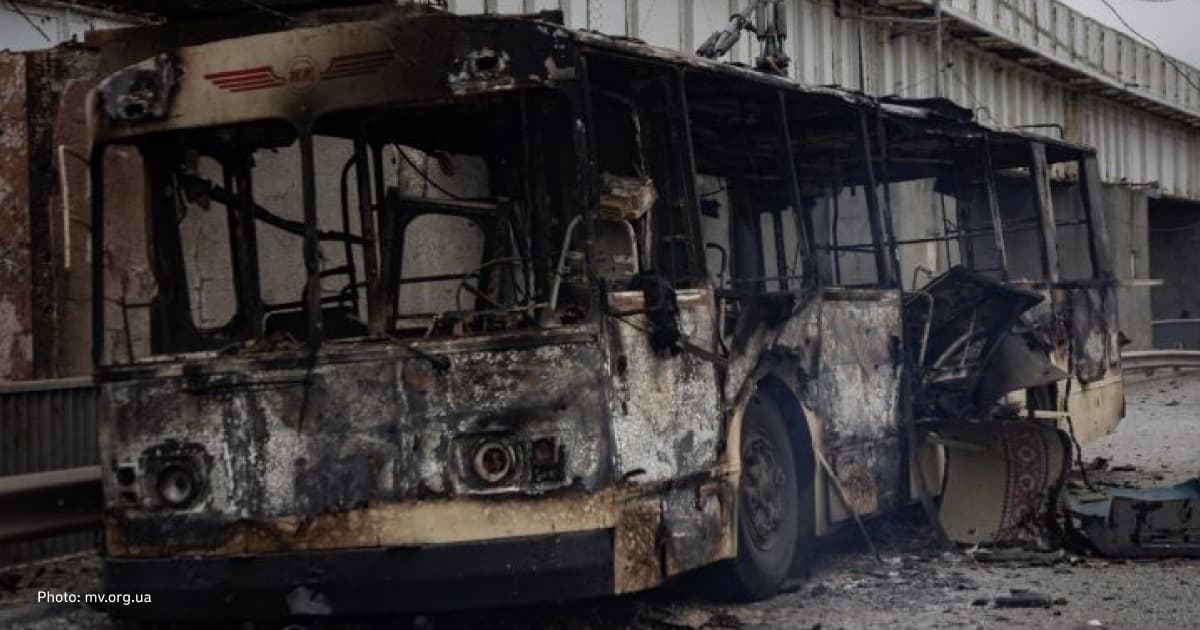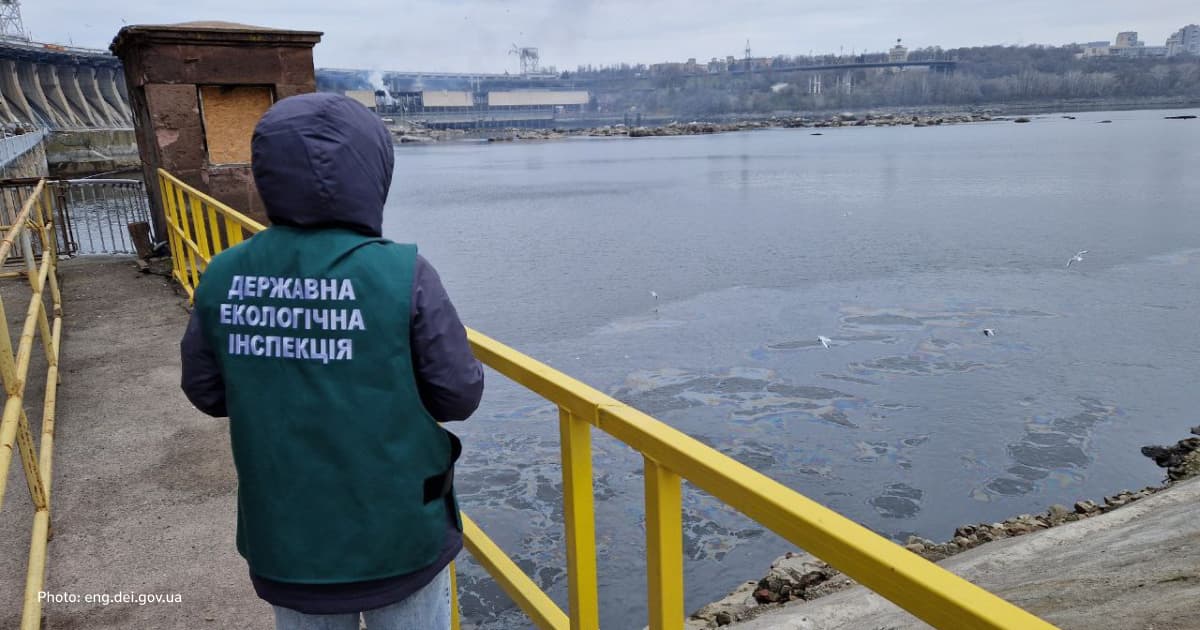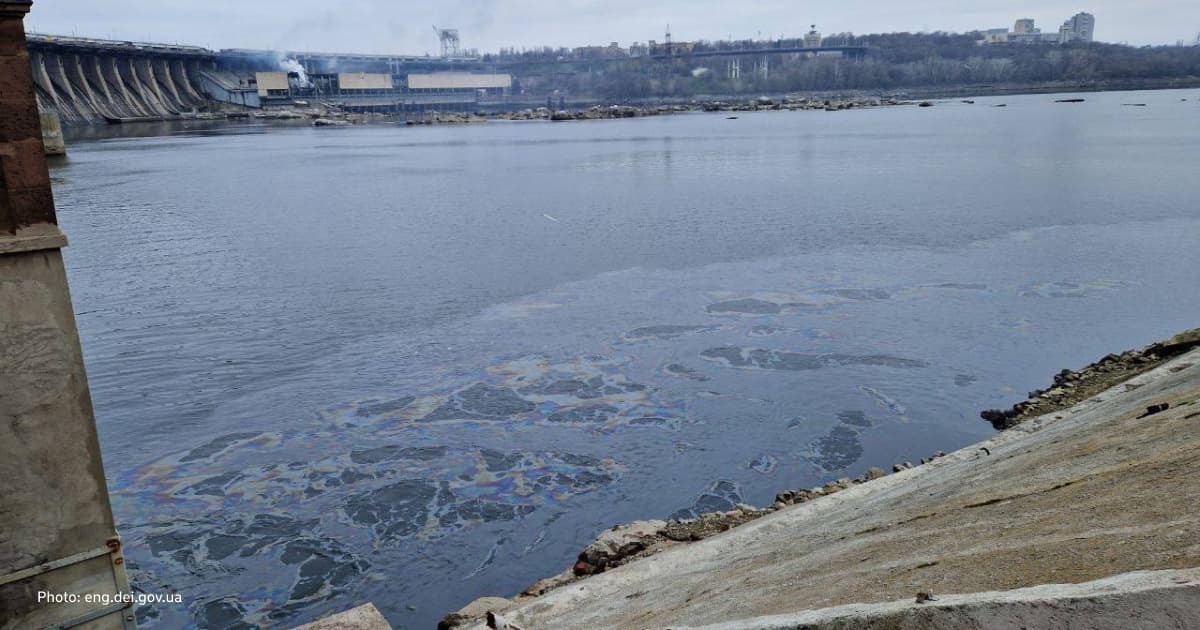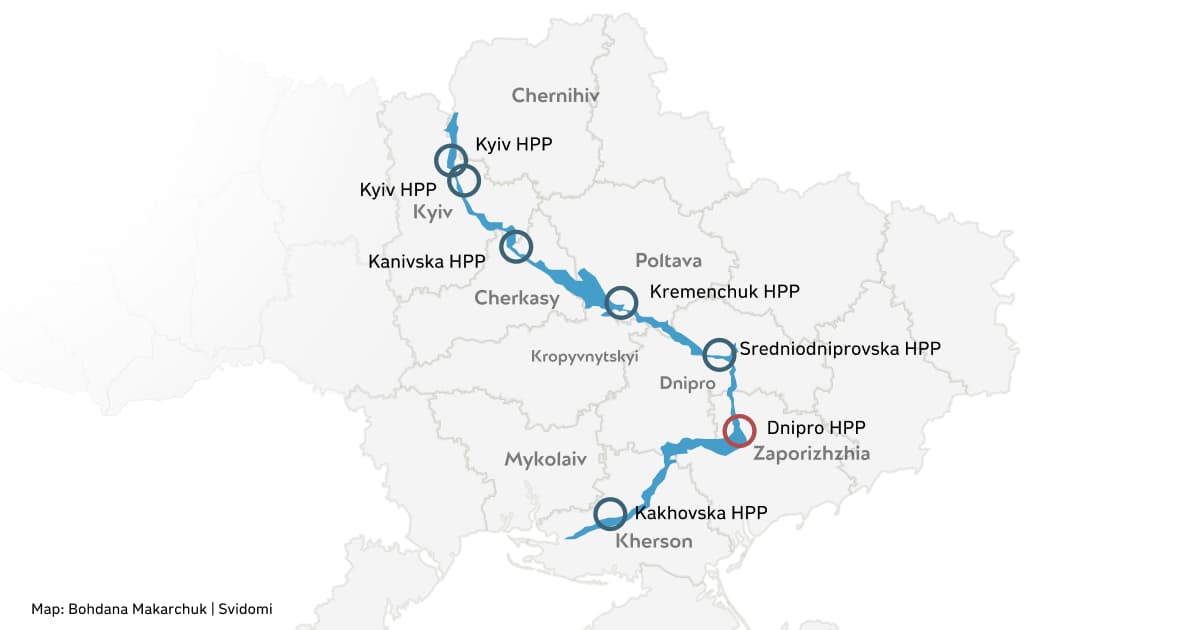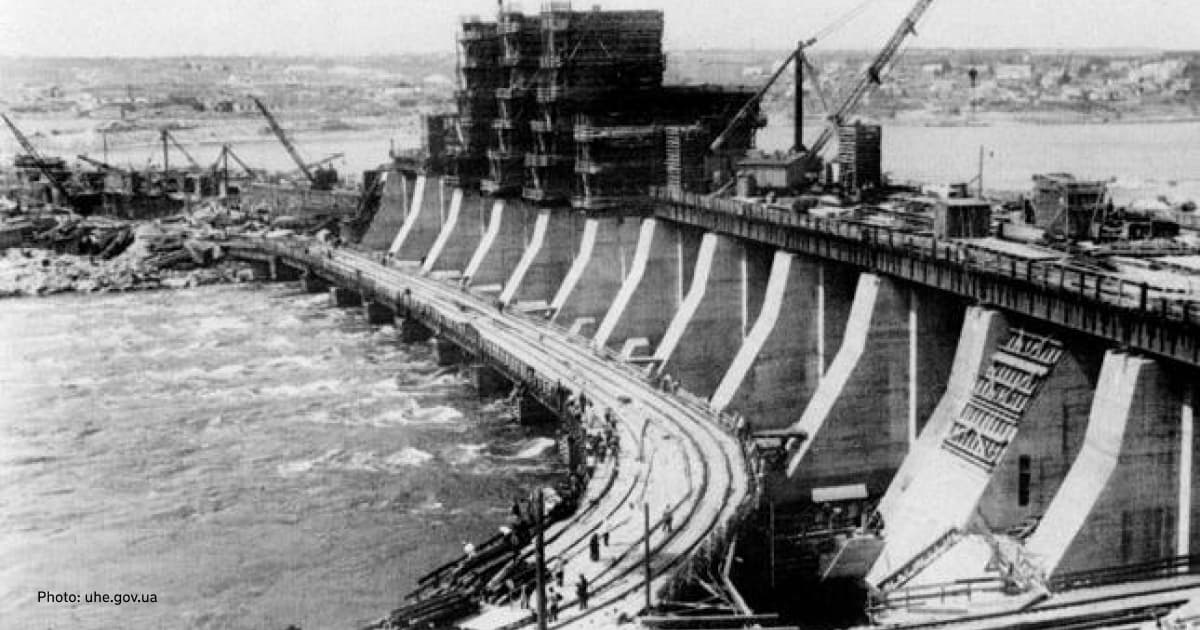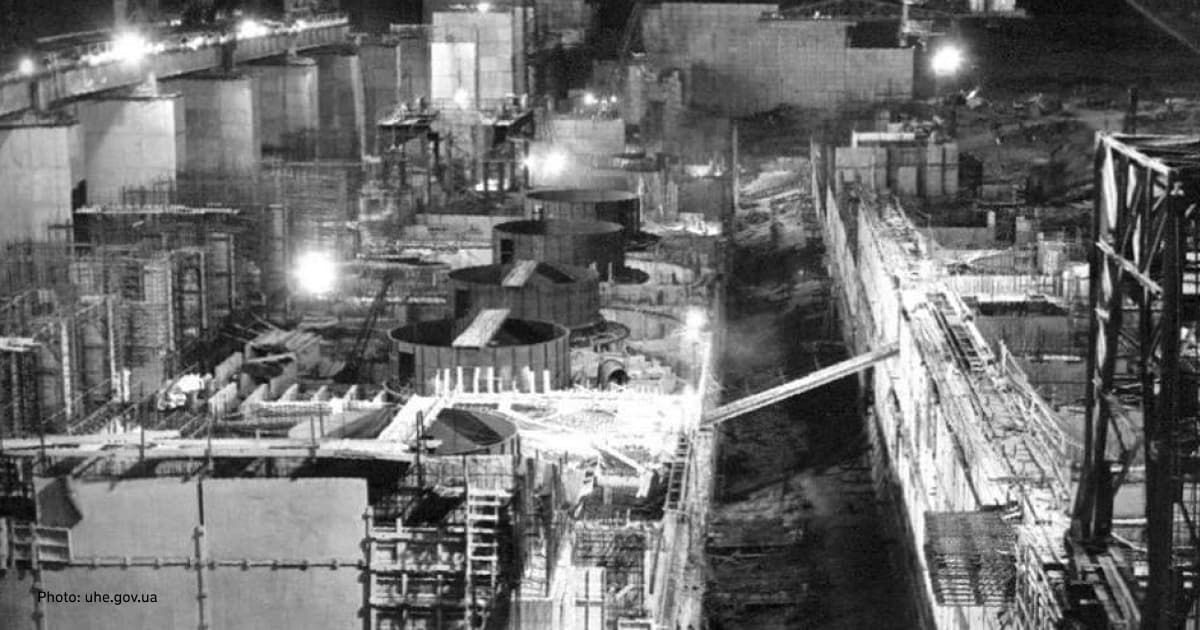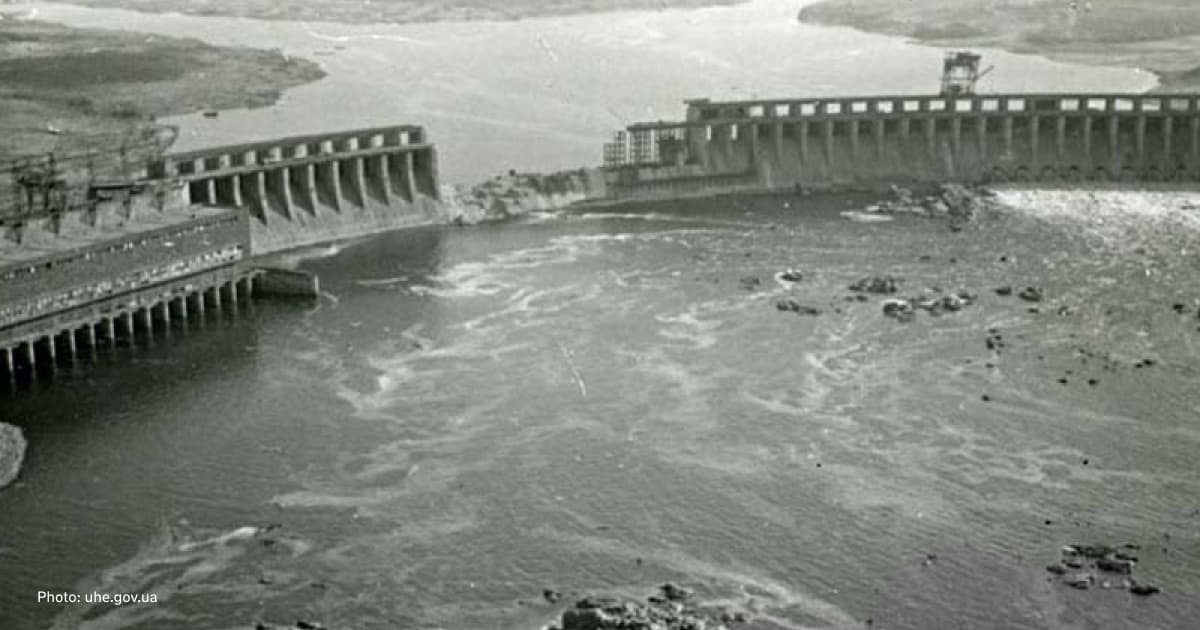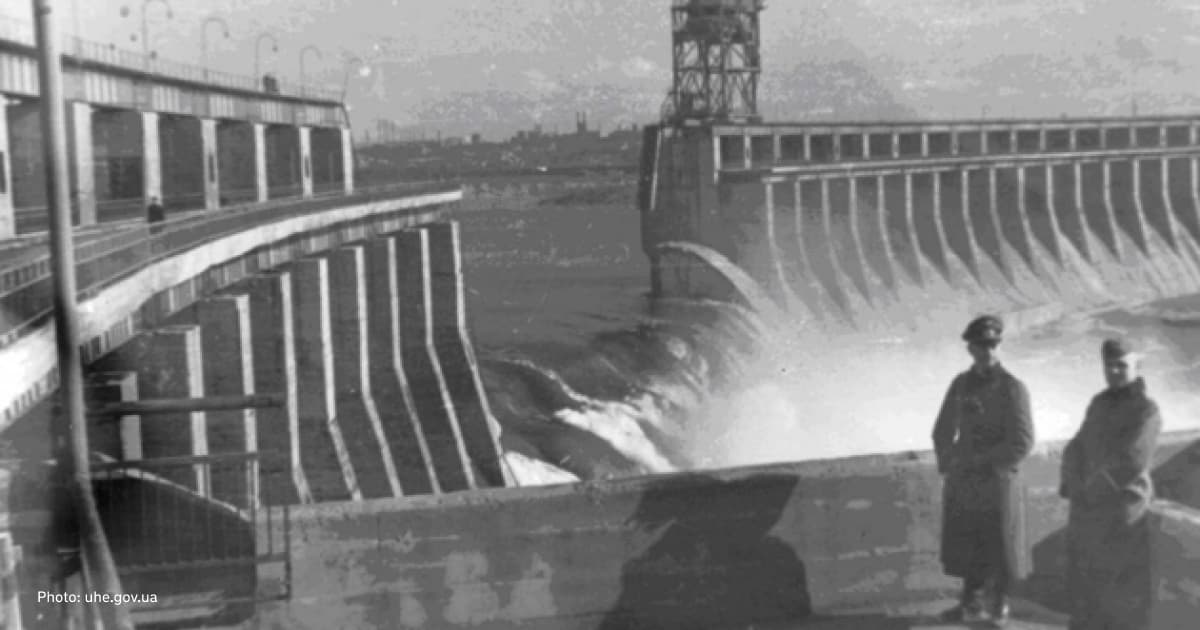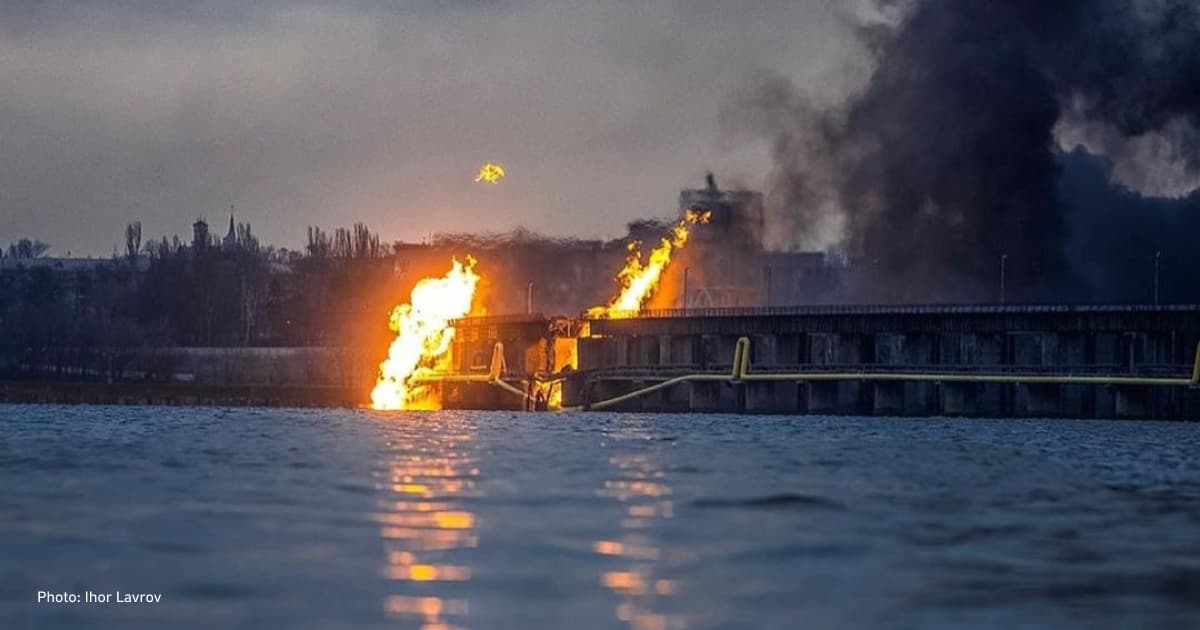The Russians launch a missile attack on the Dnipro Hydroelectric Power Plant in the Zaporizhzhia region. What do we know?
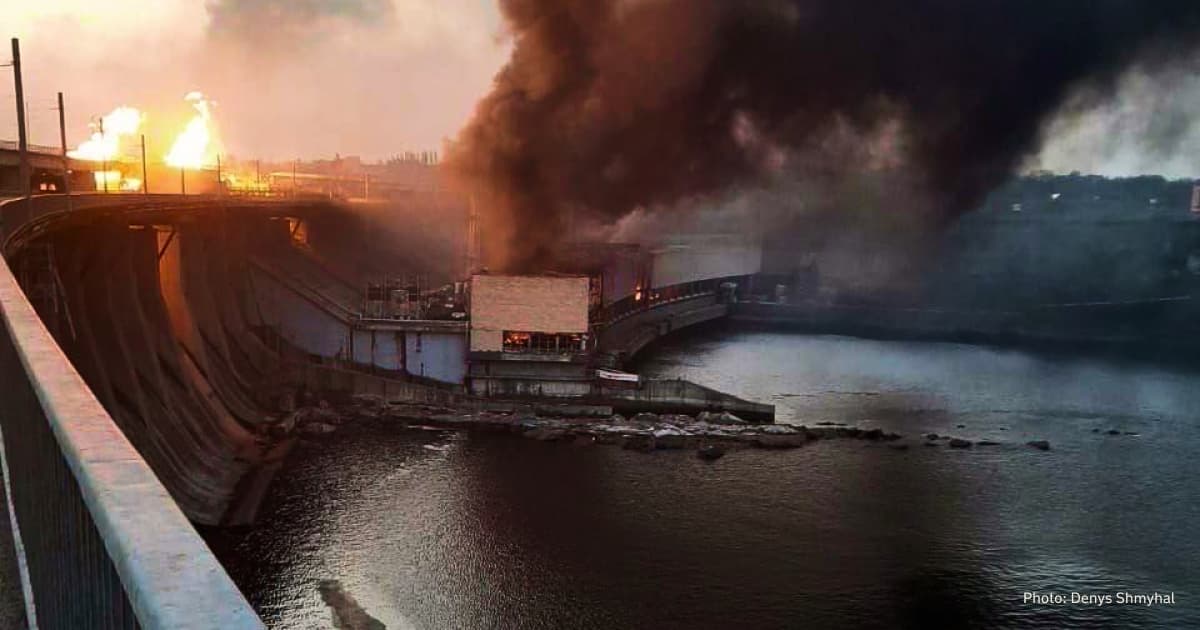
What happened?
On the night of March 22, the Russian army launched the most massive attack on Ukrainian energy infrastructure.
Ukrenergo CEO Volodymyr Kudrytskyi has made the relevant statement.
"The left bank of Ukraine has suffered. These are the regions of Kharkiv, Sumy, Poltava and Zaporizhzhia. On the right bank, it is the Kirovohrad region, and in the Odesa, Vinnytsia and Khmelnytskyi regions there have been and continue to be certain restrictions on power supply due to equipment failures. The most difficult situation is in Kharkiv, where the enemy (Russia – Ed.) has literally tried to destroy all major energy facilities," Kudrytskyi said.
The Dnipro HPP in Zaporizhzhia, Ukraine's largest hydroelectric plant, also came under Russian fire. A fire broke out at the site. Operations have been suspended, but there is no danger of the dam bursting.
The head of one of the departments of the Prosecutor General's Office, Yurii Bielousov, said that eight missiles had hit the Dnipro HPP.
"The damage is extensive, but it relates directly to the hydroelectric power plant in terms of electricity generation," said Ukrenergo CEO Kudrytskyi.
It will be recalled that on June 6, 2023, Russian troops blew up the Kakhovka HPP in the Kherson region. This caused flooding and deprived several south Ukrainian regions of fresh water. According to Ukrenergo, the damage caused by the dam's explosion amounted to more than €2.5 billion.
Aftermath of the attack
The Russian attack damaged HPP-1, HPP-2 and the dam. Two missiles hit the tower of the Dnipro HPP-2 directly. It is unknown whether and to what extent the plant will continue operating. At present, both stations (HPP-1 and HPP-2) have suspended operations.
"We will have to rebuild the entire machine room and electrical equipment. We will calculate the consequences during the day and figure out what has happened," Ihor Syrota, General Director of PJSC Ukrhydroenergo, told RFE/RL's Ukrainian Service.
As of 1:15 p.m., Kyiv time, the fire at the station was contained. However, Ukrhydroenergo CEO Ihor Syrota said the engine room remains filled with smoke.
"We are testing different modes of water release from the reservoir. By the end of the day, we expect more detailed information on what we managed to save and what capacities we can connect to the united power system," concluded Syrota.
Ukraine's State Environmental Inspectorate also reported a leak of oil products into the Dnipro and soil contamination due to the strike on the hydroelectric power station.
In total, at least three people were killed in the Zaporizhzhia region — a 62-year-old trolleybus driver travelling across a bridge, an eight-year-old girl and her 35-year-old father, and 25 injured. The aftermath of the night attack is still being dealt with.
What do we know about Dnipro HPP?
The Dnipro HPP is the first hydroelectric power plant built on the Dnipro River and the largest in Ukraine. Construction began in 1927. It reached full capacity in 1939.
The Dnipro Hydroelectric Station (romanised: DniproHES) is part of the Dnipro cascade of hydroelectric power plants, together with Kyiv HPP, Kaniv HPP, Kremenchuk HPP and Seredniodniprovska HPPs. Until 6 June 2023, the cascade also included Kakhovka HPP in the Kherson region.
Dnipro HPP consists of two power plants forming a single complex of hydraulic structures under one dam. Dnipro HPP-1 has ten hydraulic units, and Dnipro HPP-2 has eight.
The dam consists of 49 piers connected by a monolithic reinforced concrete bridge. The dam holds the waters of the Dnipro reservoir, which contains the upper "river" and lower "lake" parts.
The Dnipro HPP road crossing connects the left and right banks of the river.
In 1941, during the Second World War, the Soviet Army and the People's Commissariat for Internal Affairs (NKVD — ed.) blew up the Dnipro hydroelectric dam as they retreated from Nazi Germany. Thousands of people died.
Later, in 1943, the German army, retreating, also destroyed the machine room, the retaining wall and part of the dam.
Since the beginning of Russia's full-scale invasion of Ukraine, the plant has been repeatedly targeted. In December 2022, the Russians damaged the Dnipro HPP during another massive shelling of Ukraine.
"Dnipro HPP needs to be restored after the attack. Crews are working there now,"
said Oleksandr Vlasiuk, First Deputy Mayor of Zaporizhzhia.
Earlier damage was far less than the damage the plant sustained during the attack on March 22, 2024.
How is the Dnipro HPP important?
In March 2023, President Zelenskyy and IAEA Director General Rafael Grossi visited the Dnipro HPP.
"The Dnipro hydroelectric power plant is an important part of the system that ensures the nuclear safety of the Zaporizhzhia NPP," Grossi said at the time.
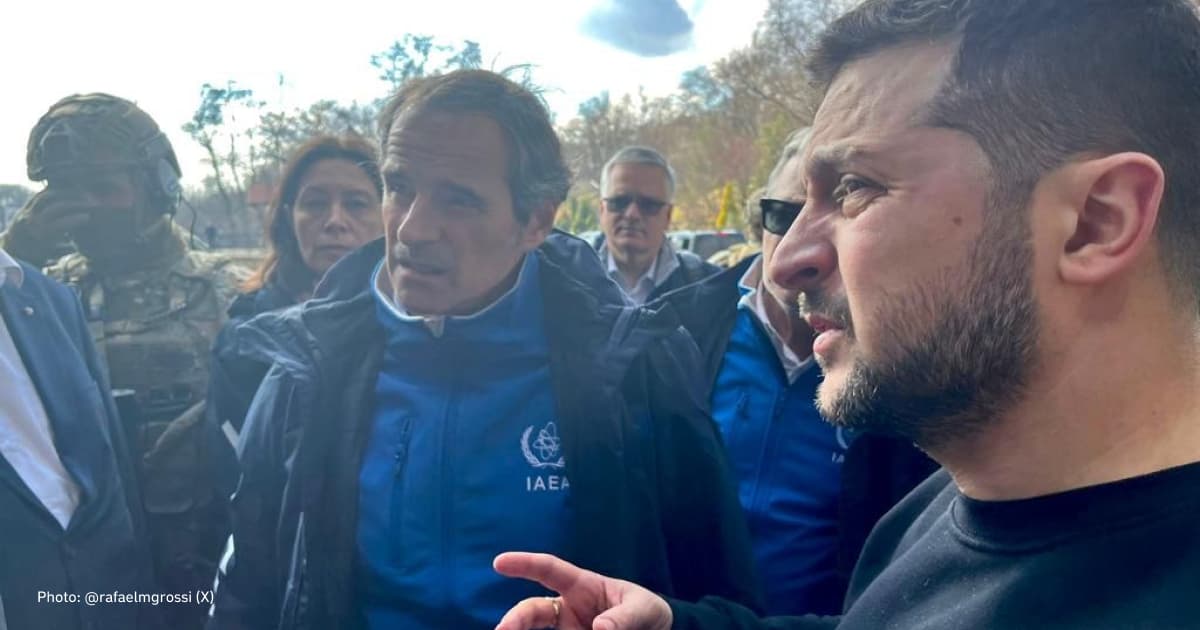
"[In Ukraine], hydropower plants produce up to 8% of electricity. However, their role in Ukraine's energy system operation cannot be overestimated. With hydro plants out of the picture, power cuts may return to Ukraine," Serhii Diachenko, an energy expert and head of the Bureau for Complex Analysis and Forecasting, told Ukrinform.
However, he adds that the Ukrainian power grid has withstood the attack despite the blackout caused by the shelling on March 22.
"And this is the most important thing. The dams of hydroelectric power plants and key structures of thermal power plants are grave structures, and it is difficult to destroy them with a single missile," Diachenko adds.
Mykhailo Gonchar, an energy expert and president of the Centre for Global Studies Strategy XXI, tells BBC Ukraine that the targets for the Russians' strikes were chosen in advance and calls the March 22 attack a follow-up to systematic actions to destroy Ukraine's energy sector since autumn 2022.
Lieutenant General and former Deputy Chief of the General Staff of the Armed Forces of Ukraine Ihor Romanenko said that Ukraine needs more anti-aircraft defence.
"Since we have little [Anti-aircraft defence], the enemy takes this into account. Therefore, after the previous strike on Kyiv [on March 21], Russians hit where they probably believe that there is no missile defence, which we ask our allies for,"
Romanenko said on the air with NV.
How did Russia comment on the attack?
The Russians began spreading disinformation about the alleged preparations to blow up the dam by the Ukrainian special services even before the attack on the Dnipro hydroelectric power station.
"They say that the Ukrainians are going to blow up the dam themselves during the spring floods to increase the number of civilian casualties as much as possible," the National Security and Defence Council's Disinformation Counteraction Centre said in a statement.
According to the Centre for Strategic Communications, the false report was spread by Russian propagandist Daniil Bezsonov.
"Accusing Ukraine of war crimes committed by itself is a classic Russian tactic. Thus, in June 2023, propagandists directed their resources to convince the world that Ukraine had destroyed the Kakhovka HPP dam," the statement reads.
The Russian Ministry of Defence called the massive shelling of Ukraine on March 22 'revenge attacks'.
"In response to the shelling of our territory, attempts to break through and seize border settlements, the [Russian] armed forces launched 49 retaliatory strikes with high-precision weapons... including hypersonic Kinzhal missiles," the Russian Defence Ministry said in its weekly report.
Amid the attack, Russian presidential secretary Dmitry Peskov said that "Russia is at war". He added that it allegedly started as a special operation, but now it has also become a war for the Russians.
What was the response in Ukraine and the world?
"The world sees the targets of Russian terrorists as clearly as possible: power plants and energy supply lines, a hydroelectric dam, ordinary residential buildings, even a trolleybus," President of Ukraine Volodymyr Zelenskyy said in his response to the March 22 attack.
He recalled the cost of delays in Ukraine's aid packages, which include air defence.
"Patriot systems must protect Kharkiv and Zaporizhzhia, and we need air defence to protect people, infrastructure, homes and dams. We need these solutions,"
Zelenskyy concluded.
The Prime Minister of Ukraine, Denys Shmyhal, responded to the strikes on the country's power system.
"About 20 substations and power plants, including the Dnipro HPP, have been hit. Thanks to the additional protection of our power facilities, we withstood the attack. Preliminary, we need a day to supply power to all household consumers," the Prime Minister said.
Ukrhydroenergo CEO Ihor Syrota called the consequences of the attack on Dnipro HPP "the result of the world's inadequate response" to the bombing of the Kakhovka HPP.
"If there had been a proper assessment, sanctions imposed and proper decisions made, the enemy would not have dared to fire missiles at hydro facilities," Syrota added on the Ukrainian national telethon.
Estonian Foreign Minister Margus Tsakhkna said that the consequences of the Russian attack on 22 March are "Part of the reality to which Putin is transforming the recent so-called votes of confidence (presidential elections in Russia — ed.) into".
British intelligence believes that Russia will continue air strikes on critical Ukrainian targets.
"This is symptomatic of a prolonged campaign where tactical aircraft such as fighter aircraft and helicopters continue to have a limited impact on the overall conflict,"
the UK Ministry of Defence said in a statement.
Head of European Diplomacy Josep Borrell assures that "all those responsible will be brought to justice".
In response to Russia's attacks, Lithuanian Foreign Minister Gabrielius Landsbergis said that the West was making mistakes in its strategy to support Ukraine.
"We choked the weapons supply, we failed to provide enough air defence, and now we ask Ukrianians to sit on their hands while cruise missiles land on their families. Such mistakes are setting the course of the entire century. And there is no justification for any of this,"
Landsbergis wrote.
The day before, the Financial Times reported, citing sources, that the United States had called on Ukraine to halt drone strikes on Russian energy facilities.
In response, Deputy Prime Minister for European and Euro-Atlantic Integration of Ukraine Olha Stefanishyna said that Ukraine "is fighting with the capabilities, resources and practices it has today".

